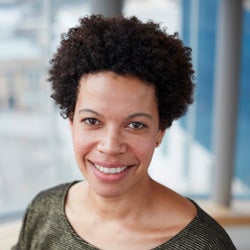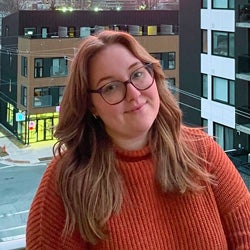Beyond the stage: U of T drama students explore diverse career paths through internship course

Seika Boye (top left), an assistant professor, teaching stream in the Centre for Drama, Theatre & Performance Studies, says the placements offered through the course are designed to benefit students and arts organizations alike. The course's inaugural cohort of students included Elle Baron (top right), Noah Rudder (bottom right) and Lisha Zhao (bottom left) (supplied images)
Published: February 6, 2025
Many drama students aspire to land roles in performance, production or design, but a new course at the University of Toronto’s Faculty of Arts & Science is exposing them to career paths in other areas that are crucial to the sector.
The course, Internships: Performance and Cultural Arts Organizations, comprises 12-week placements with local performing and cultural arts organizations such as Project Humanity, Dance Collection Danse, Intermission Magazine and others, and aims to encourage students to consider non-artistic internships in a field they love.

“These are positions in performing arts and cultural arts organizations that revolve around making performance possible, supporting artists, connecting with communities and preserving artistic legacies,” says Seika Boye, an assistant professor, teaching stream in the Centre for Drama, Theatre & Performance Studies who designed the course with support from the Experiential Learning Faculty Fellows Program.
“Many students come in with a focus on performing or working in production and design, writing, directing, all of those well-known roles. But they aren't as aware of what it means to work in development, administration, fundraising or education outreach. I saw a need to give them exposure to those other roles.”

The inaugural session of the course features 17 students including Noah Rudder, a Victoria College member who is completing a double-major in peace, conflict and justice studies and drama. Rudder is working with SummerWorks – an organization dedicated to nurturing artistic risk and innovation in contemporary performance – as a programming assistant, helping plan and organize the organization’s annual festival.
“I’ve been able to develop programming skills like email monitoring, submission sorting and proficiency with platforms like AirTable and Google Drive,” says Rudder, who was recently named a 2025 Rhodes Scholar. “It’s been brilliant to see the administrative side of artistic organizations like SummerWorks and the preparation that goes into large- and small-scale events from the eyes of the planner rather than the artist.”
Rudder says the placement has also enabled him to forge new relationships and connections. “I’m in a unique position to have access to established individuals in the Toronto theatre community,” says Rudder. “It’s awesome to talk to them because they were also once burgeoning artists trying to figure out how to find work and learn what type of art they wanted to create.”

Rudder’s classmate Lisha Zhao is also working with SummerWorks, but as a development assistant – supporting the organization’s fund development projects involving government grants, private foundations and individual donors.
“I can link what I studied in class to real-life situations and put textbook materials into practice,” says Zhao, a University College member, fourth-year drama major and management specialist at Rotman Commerce. “I’ve enjoyed the extent of trust I’ve received from my supervisors, and how I was comfortable taking the initiative to point out areas of improvement.
Zhao says the internship has boosted her confidence and knowledge about opportunities in the arts. “I went from a place of not knowing anything about working in a non-profit arts organization to knowing a great deal,” she says. “This internship allowed me to open myself up to opportunities and positions that I never would have thought about.”

For Elle Baron, a fifth-year student in the drama specialist program and Woodsworth College student, working as an education and community engagement assistant with Tarragon Theatre has been an enriching experience.
“Being part of events like opening nights and community programs not only strengthened my professional network and contacts but also gave me a first-hand look at how theatre creates a shared space for connection and storytelling,” says Baron, whose responsibilities include providing administrative support and conducting research to help create resource guides for general audiences as well as students.
“One of my administrative responsibilities includes managing applications for various courses Tarragon provides,” says Baron. “This involves maintaining organized spreadsheets, following filing system templates and corresponding with a large number of applicants.
“I’ve definitely gained a new perspective on the types of jobs and positions that exist within the theatre industry during this placement, especially in the context of education as well as the many positions involved behind the stage that allow productions and theatre companies to function.”
Boye says she’s delighted to see the students develop their networks, skills and confidence – as well as their awareness about potential career paths.
She adds that it’s equally vital that the placements benefit arts organizations by providing them access to the talent they need.
“It was important to me that the roles serve an actual need within the organizations,” Boye says.
“Arts organizations are so often under-resourced, and that only got worse following COVID-19. And so thinking about the reciprocity between the university and the cultural arts sector was really important to this course.”



